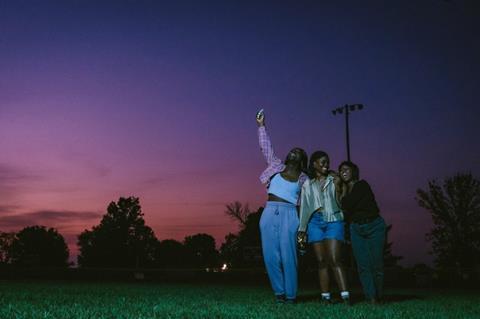Shatara Michelle Ford’s feature premiered at Black Star and screens at the Berlinale

Dir/scr: Shatara Michelle Ford. US/Taiwan/UK. 2024. 128mins
With their second feature, writer/director Shatara Michelle Ford delivers a complex, urgent portrait of Black community, turning a road trip through America’s heartland into a journey of identity and belonging. As three Black queer femme thirtysomethings head out to search for a friend who has gone off-grid, Dreams In Nightmares explores their relationship to their increasingly intolerant homeland, and each other, in a lyrical celebration of the often-unconventional ties that bind.
A political film that shows rather than tells
Arkansas-born, Missouri-raised Ford’s 2019 debut feature Test Pattern toured the festival circuit before being nominated for multiple Gotham and Independent Spirit awards, and Dreams In Nightmares should further mark the director out as an important voice in Black cinema. Heading for Berlin’s Panorama after premiering at Blackstar Film Festival, the film should have a broad appeal for fans of authentic independent cinema.
When college friends Z (Denee Benton) and Tasha (Sasha Compere) both lose their jobs — Z as a creative writing professor in Los Angeles, Tasha as a business consultant in New York — they impulsively decide to take a trip with poet Lauren (Dezi Bing) to find missing friend Kel (Mars Storm Rucker). Their journey takes them from Brooklyn to Mexico, via stops including Pittsburgh, where they attend a performance by blistering trans poet Joss Barton, and the mostly-white suburbs of Iowa City, where Kel’s spiky ex Sabrina (Jasmin Savoy Brown) is attempting to live a cookie-cutter life with her new girlfriend.
Amongst a strong ensemble cast, Benton’s Z emerges as the story’s central point; a recurring dream she has about a doorway she is unable to pass through proves to be a thematic nucleus. “I think my ancestors are trying to tell me something,” she says, over black-and-white archive images of cotton fields, food lines, Black family gatherings in America’s dustbowl.
Indeed, as indicated by a title which speaks to both to the Black experience in America and its own dreamlike quality, the film is delicately layered. The echoes of Black history, of inter-generational trauma, are keenly felt as the trio journey through landscapes in which they are never directly challenged but nevertheless feel uncomfortable. Lauren’s determination to only visit Black-run restaurants – found via a modern ‘Green Book’ of sorts – falters in rural areas populated by mom-and-pop joints in which their otherness is amplified.
Framing from cinematographer Ludovica Isidori often places Z in the centre of a darkened screen or in the corner of a wide, shadowy frame, bringing a subtle horror film sensibility to this story of cultural displacement. At other moments, the characters are lit with a warm glow, light seeming to radiate from their skin. An effective score from Lia Ouyang Rustle (returning, like Isidori, from Test Pattern) has its roots in Black music from jazz to jungle and hip-hop; gospel choir harmonies loop in the background, discordant horns intrude.
With their accomplished handling of these creative elements, Ford has crafted a political film that shows rather than tells. While each pitstop is designed to highlight the prejudices threaded through the fabric of everyday American life, they are given the space to play out naturally. An awkward dinner at the home of Kel’s parents (Regina Taylor and Robert Wisdom) in Kansas City is an uncomfortable highlight, illustrating societal expectations that, however well-intentioned, can prove suffocating.
Yet, there is a defiance that not only punctuates the tension, but brings real moments of joy. Z, Tasha, Lauren and Kel may be at odds with traditional America, and acutely aware of the discomfort this brings, but this does not define them. Nor are they boxed in by their gender, their sexual orientation, their desires. They simply are what they feel they must be.
Thrifted, lived-in costuming from Mikhaela Zabalerio underscores the individual personalities of these women, from the reserved Tasha’s dark outfits to the outspoken Lauren’s explosions of colour and the down-to-earth Z’s natural tones. And beautifully-lit close-ups, some of which gently break the fourth wall, are a further invitation to step through the door into this brave new world.
Production companies: 120E Films, Spark Features, Paradise City
International sales: Memento International sales@memento-films.com
Producers: Pin-Chun Liu, Shatara Michelle Ford, Naïma Abed, Adam Wyatt Tate, Josh Peters, Robina Riccitiello, Ben Stillman, Ana Leocha, Tyler Bagley, Chris Quintos Cathcart
Cinematography: Ludovica Isidori
Production design: Eloise Ayala
Editing: Cyndi Trissel
Music: Lia Ouyang Rusli
Main cast: Denée Benton, Mars Storm Rucker, Dezi Bing, Sasha Compère, Charlie Barnett, Molly Bernard, Alfie Fuller, Malek Mouzon, Joss Barton, Jasmin Savoy Brown, Regina Taylor, Robert Wisdom
























